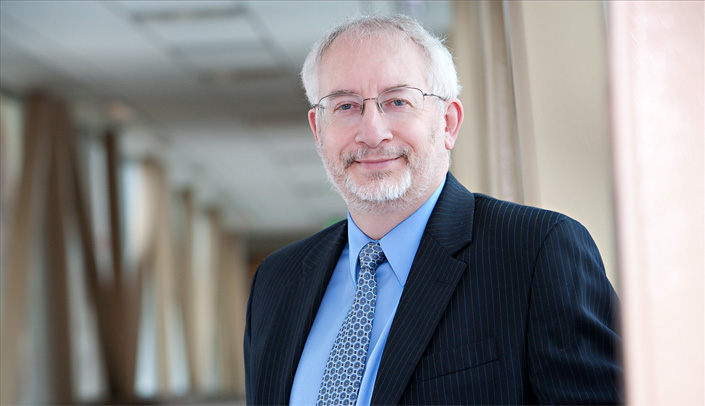On Jan. 5, the annual College of Medicine White Coat Ceremony for the entering class of medical students took place, after having been delayed from August in the hope that it could take place in person rather than virtually.
Alas, that was not the case, as the pandemic did not cooperate. More than 300 individual computers and devices were logged into the program. For this month’s InterCOM message, I would like to share with you the bulk of my remarks to the students, along with their parents, families and friends. I do so because, in light of the year that we have just shared together, the comments have a great deal of meaning to me. I hope you agree.
“The White Coat Ceremony is the first step in the transition of our newest class of students in the UNMC College of Medicine to becoming physicians. The white coat symbolizes the privilege that medical professionals are granted to participate in a unique and very personal way in the lives of their patients. It embodies the highest principals of respect, competency, service and integrity, and it should not be donned casually.
“The White Coat Ceremony was introduced into U.S. medical schools in the early 1990s, and a majority of America’s medical schools now have some version of the ceremony. It marks the beginning of what will be a long and challenging journey for each of you. Over the weeks and months ahead, you will be spending countless hours learning how to conduct a medical history and physical exam and use that information to generate a diagnostic and treatment plan. The amount of information you will be asked to master will be overwhelming at times, and you will almost certainly find yourself sacrificing participation in social and family events, as well as sleep at times, in order to accomplish this.
“However, medical and scientific knowledge alone do not make one a complete physician. In addition to being a science, medicine is also an art. The art is embodied in the relationships that you establish with patients. Each patient is unique and reflects not only their genetic makeup but the different environments in which they have lived and currently live. We are part of a tremendously diverse and global society, and you will encounter patients from a wide variety of cultural, geographic, social, and economic backgrounds that will impact their health and your ability to care for them. Understanding the influences of these factors is also part of being a physician and wearing the white coat.
“Although much of what we will teach you will focus on such things as the best combinations of drugs, surgery and other treatments for a specific disease, there will be times that you will not have anything medically to offer your patient that will cure or significantly modify the course of their disease. Surprisingly, it may be at those times that you will be of the most benefit to your patient, and in turn have your most rewarding experiences as a physician.
“Faced with patients with essentially untreatable end-stage fatal disease, you may have little to offer but your emotional support and compassion. Yet, as many of our care providers have unfortunately experienced firsthand during the current pandemic, that is often what is most needed and is just as much a part of my being a physician as is meeting their medical needs. This is also what it means to wear the white coat. Don’t shy away from it. It can be one of the most satisfying parts of your career.
“In closing, I belatedly welcome each of you into the fellowship that is the practice of medicine. It is a wonderful and fulfilling career. There is much controversy going on around us about the economics and politics of health care. However, the true profession of medicine and the professionalism, as symbolized by the white coat, is about the sanctity of the individual physician-patient relationship. Patients will be placing their lives in your hands and you must not violate their trust.
“Shortly, you will be donning your white coats for the first time. Your development as a physician is early in its course. Being a physician is a lifelong process of education and growth that you will do in partnership with your patients and your peers. It is our honor to be with you today as you embark on this wonderful journey.”
As we look forward to the new year, hopefully with the efficient, widespread and equitable distribution of highly effective COVID-19 vaccines, I once again thank you for all that you are doing to support each other and meet the needs of those who depend upon us for their care, education and to advance medical knowledge.
Happy New Year!
Bradley Britigan, MD
Dean
UNMC College of Medicine
